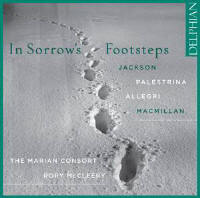Texte paru dans: / Appeared in: |
|
|
Outil de traduction (Très approximatif) |
|
|
Reviewer:
Alexandra Coghlan Two musical modes tussle here over this emotive text. The listener is tugged between peremptory collective utterances that brush tragedy aside with brisk violence, and keening strands of individual lyricism (beautifully shaped by the consort’s sopranos) that wind themselves like a silk shroud around this beautiful hymn. Portamentos trickle down from upper voices – tears running down the face of melody – and Monteverdi-style trills set the music trembling; but the voices find consolation in radiant moments of chantlike certainty. Carefully paced and shaped by the group’s director Rory McCleery, this feels like a modern classic in the making, sensitive and endlessly responsive to the text. Like James MacMillan’s Miserere, with which it bookends the disc, Jackson’s Stabat mater is audibly rooted in the music of the Renaissance. This shared musical language makes for a natural flow through a programme that also includes Palestrina’s Stabat mater and Allegri’s Miserere – Renaissance mirrors to their contemporary counterparts – as well as some shorter Palestrina motets. The group’s lean forces offer a pleasing clarity through the contrapuntal textures of the Palestrina and keep the double-choir Stabat mater lean and rhetorical rather than monumental. But the MacMillan doesn’t respond quite as well to so severe a treatment and, despite some wonderfully free, soloistic singing from the group, never quite finds the same space and bloom that The Sixteen and Harry Christophers achieve in their more expansive account. |
|



